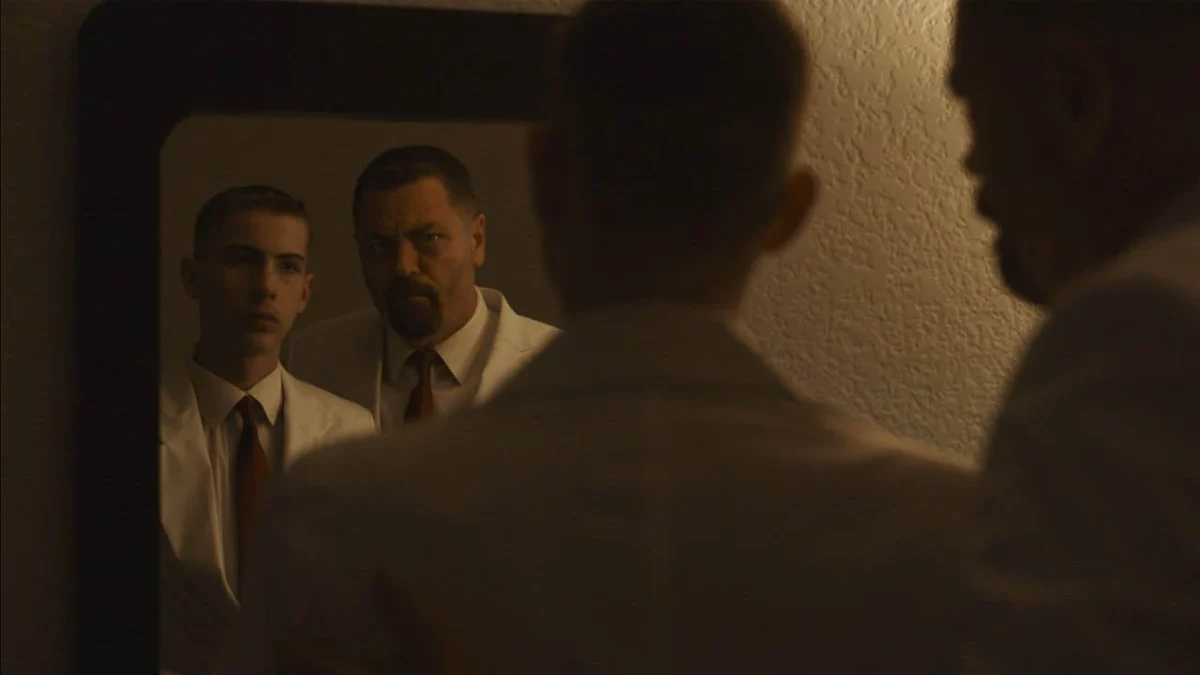It’s rare for a crime film to examine a fringe movement or ideology without either galvanizing or othering it for the sake of dramatic license. By choosing to centralize characters with specific beliefs, these films are either consciously or inadvertently taking a stance. “Sovereign” has no pretense of neutrality, but it does examine an unusual sect of radical anti-government sentiments that isn’t tied to the usual segment of extremism generally depicted in contemporary fiction. The analysis is not only worthwhile, but serves as a compelling canvas on which to paint a heartbreaking father-son story.
Loosely based on real events, “Sovereign” follows the teenager Joe Kane (Jacob Tremblay), whose father, Jerry (Nick Offerman), considers himself to be a sovereign citizen, meaning that he does not consider himself liable to governmental policies and laws. While Jerry has found personal gain in touring the country to speak about his motivation and strategies, it’s not a blind conspiracy that he’s taken advantage of.
Jerry is certainly well-read and is able to make a convincing enough case to vulnerable listeners who share his frustrations with governmental overreach. Joe is often left to fend for himself in his father’s absence, but authorities have grown suspicious of his lack of involvement in formal education. As Joe begins to question where his future lies, Jerry’s delicate avoidance of justice turns into an increasingly combustible situation.
Writer/director Christian Swegal crafts an intimate, strategic look at the nuances of this relationship, as gradual details are revealed that point towards a complex history. Although it’s suggested that Joe has always considered himself to be exempt from certain expectations, tragic events in his life spurred him to find meaning in a loose network of anti-government protestors who have steadily adopted their own language.
This isn’t a film about the seductive nature of conspiracy theories, but about the alternative reality that believers find themselves in. In its most heartbreaking moments, Joe finds that his father has seemingly conceived of a sound rebuke to any attempts he’s made to normalize their situation.

Also Read: 10 Unconventional Coming-of-Age Movies Worth Exploring
“Sovereign” also identifies that Jerry’s frustrations aren’t unfounded, as the film is keen to point out how easy it is for people to be lost within the system. It’s often that the people he’s locked in combat with are simply following orders or fulfilling obligations that they only have a loose understanding of, which fuels deeper animosity on his part.
However, “Sovereign” is also quite clever in examining Joe’s emotional development as he begins to understand his father’s lack of clarity. What begins as a series of unusual observations about redundancies within federal laws becomes a truncated opus of illogic, as Jerry is so trapped within his insularity that none of his logic is remotely palatable.
While the stark, observational quality of the film is effective in showing the tiny moments that map the passage of time, “Sovereign” is also attuned to its characters’ hyper-specific worldview. Jerry doesn’t perceive the specifics in recent events, and thus Joe is denied the facets of a standard childhood. It’s a subtly effective film about the unusual state of Obama-era America in which radicalism began to rear its ugly head, but had not yet turned into a cohesive state.
The film is able to suggest that there is some empathy within Jerry. Even his egocentric speaking tours contain thoughtful interactions with people he seems to have pity for. Although Swegal draws tension out of the inherently unstable situation, there’s also the suggestion that Jerry’s increased anger is a result of the thought of Joe moving on and finding stability with a normalized community.
Offerman gives what may be the performance of his career, proving that the strong dramatic turns he gave in “Devs” and “The Last of Us” were not flukes, but rather the emergence of one of the greatest contemporary character actors. Jerry is at times pathetic, yet terrifying, and Offerman is able to make his degree of self-awareness fairly ambiguous. It’s now been a decade since Tremblay gave his breakout performance in “Room,” and it should come as no shock that his aptitude for choosing auteur-driven projects has paid off. His work as Joe is emotionally mature and quietly devastating, making the film’s bleak final chapter even more effective.

Check Out: 25 Great Dad Movies: Memorable Fatherhood Movies of The 21st Century
As well-realized as the father-son relationship is, the greatest performance in “Sovereign” is from Dennis Quaid as Chief John Bouchart, a veteran of the police force who is briefly called in to question Joe about his father’s unruly activities. Quaid may have faded from the spotlight in light of his unfortunate political statements, but his work in “Sovereign” is a reminder that he used to be considered one of the industry’s greatest living actors.
He’s able to find a sense of commonality that is unusual within depictions of law enforcement, and hints at the flaws within Bouchart’s thinking with an otherwise sympathetic portrayal. A film as issue-oriented as “Sovereign” wouldn’t have worked had it completely lionized the police force, but Quaid’s performance is so singular that it never feels as if there’s a judgment on anything but Bouchart as an individual.
There’s a simpler and less interesting version of “Sovereign” that attempts to more directly draw parallels between Bouchart and Jerry, but the film is able to note the comparisons between them through a storyline involving the chief’s son, Adam (Thomas Mann), who is also a police officer. The commentary on what fathers pass on to their sons is legitimately insightful, as the film’s conclusions on the necessity of letting go manage to go in unexpected places. There’s also enough legitimate chemistry between Mann and Quaid that any of the slightly underwritten segments are still effective.
“Sovereign” is ironically so strong as an impressionistic, observational piece that the film is slightly lessened when it wraps up in a more conventional manner. Although some of the film’s side characters, including a love interest of Jerry’s played by Martha Plimpton, are underutilized, “Sovereign” concludes with one of the year’s most gripping set pieces. This is a classical work of tragedy that’s as ponderous as it is shocking, and should not be mistaken for anything but one of 2025’s essential films.








![The Forgotten Battle [2021] Review: A Triumphant War film That Never Loses Steam](https://79468c92.delivery.rocketcdn.me/wp-content/uploads/2021/10/The-Forgotten-Battle-2-768x405.jpg)